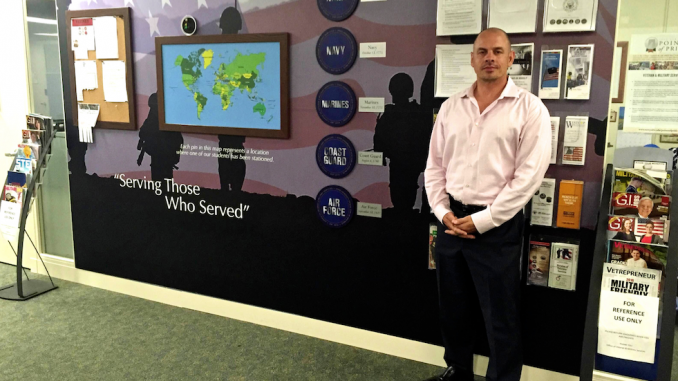
Straight out of a rural New York high school, young Jason Gilliland, like many with cold feet about going to college, joined the military instead. At 19, he served his first deployment in Nicaragua — and within six months of returning, he was deployed to Kosovo at the height of the Serbian and Albanian conflict. Two years after 9/11, Gilliland’s final tour brought him to Iraq, where he served in the invading forces that signaled the start of the Iraq War. But at 26, he had to face an obstacle different from any others he had previously faced: starting college as an adult veteran.
With over 19 years of total military experience and training in higher education administration, Gilliland now serves as the coordinator of the SUNY New Paltz Office of Veteran and Military Services to help student veterans achieve their goals and assimilate into university life. The office provides assistance to over 330 student veterans, active service members and their dependents through events, academic advising, work study programs, and above all, a great sense of comradery.
The Office of Veteran and Military Services opened two years ago, with you at the helm, and within that time the campus has earned national recognition for being military friendly. What impacts have the office made on the students involved?
We’ve had students choose New Paltz over private schools they’ve had scholarships to because the word of mouth about the veteran experience here was of more value than knowing that they simply have their tuition paid for. The students know we care and understand what they could be going through, some of which are very tough and trying situations. I had one student whose friend was killed right next to him while serving in Iraq and the anniversary of his friend’s death every year was just a very hard day for him to deal with. It didn’t seem to matter where he was or what he was doing, when that day came he had a tough time coping.
Many veterans start their college careers as adults, as you did. What was that like?
Being 10 years older than kids I was sitting next to was very hard to relate. Sometimes their biggest concerns in life are which shoes to wear that day or the struggle they had to get out of bed to make it to class five minutes late. I had a couple of friends, but at the time there wasn’t any kind of veterans office to keep all of us veterans together — this was all before veteran affairs offices got popular. I would go to class, do my thing and go home for the day. I kept my mind on graduation.
You traveled over 3,000 miles away from home to Nicaragua for your first deployment. How did that make you feel?
Coming from a very rural farming background, I had never even heard of Nicaragua, so I felt really excited by the novelty of it all — going to this exotic place in the jungle. It was a humanitarian effort after Hurricane Mitch devastated Central and South America. The country was beautiful and the amount of gratitude the locals had for us being there was nice. It made me feel like going out and helping people was what I joined the military for. But the reality set in very soon. Entire villages were covered in landslides and complete roadways and bridges were leveled, which was very sad. That part of it was tough, but I think some was overshadowed by the good feelings I got when we were helping out the locals.
Any particular people you encountered there that stuck with you?
There was a stadium that was not far from the base that we were staying in and we were allowed to go there for some downtime. This 10-year-old kid lived underneath the bleachers, and made his living shining shoes. We had to wear boots as part of our uniforms. So when he saw hundreds of our guys coming, he made out like a bandit! This kid would sit there, at 10 years old, smoking a cigarette and shining people’s shoes. And that was his routine. I’ll remember him for the rest of my life.
In March of 2003 you were deployed to Iraq and spent 12 months there. How did the military experience change post-9/11?
Once major units started getting into Afghanistan, a lot of guys would not come back. If they did, many would return maimed, with missing legs or arms. When you’re in a peacetime environment, you focus on training and at moments you might actually start to feel bored. But after 9/11, the tempo of everything changed. Friends were not coming back, and when you went, you didn’t know if you’re going to come back either.
I’ve lost a lot of friends over the years, either to Iraq or Afghanistan. I’ve also lost some that did come back but mentally are just not there anymore and struggle with Post Traumatic Stress Disorder (PTSD) or traumatic brain injuries. After a while, you almost get desensitized from it. You see it so much that it just becomes the norm.
What influence has the military had on who you are today?
The military gave me a sense of purpose that I never had—a sense of belonging of something that was much bigger than myself. I was not on a good path in high school. It took me four schools to graduate and I had been arrested once before joining the military. I was headed for some very bad and dark roads. The military changed me as an individual. It provided me with a path, a way to grow and taught me to be a positive influence and somebody that my father could be proud of. I’m thankful.
